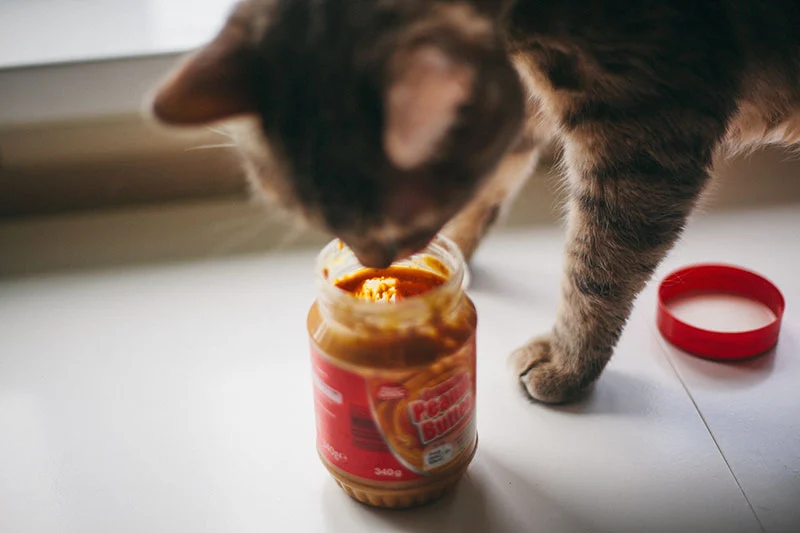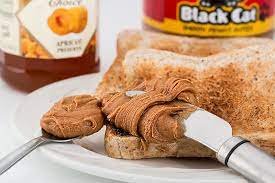Is peanut butter safe for cats to eat? In a strict sense, yes; however, there are a great deal of exemptions that must be taken into consideration. You can safeguard the health of your cat by educating yourself on appropriate serving sizes, ingredients that should be avoided, and feline nutrition in general.
Because peanut butter is such a popular treat for canines, you might be curious about whether your cat can partake of this tasty spread. To answer your question in a nutshell, peanut butter can be consumed by cats. But there are some other things to think about before you give your cat a spoonful: If you feed peanut butter to cats, are there any nutritional benefits to doing so? When it comes to feeding peanut butter to cats, are there any potential dangers? What precautions should be taken when giving peanut butter to a cat? In order to provide satisfactory responses to these questions, it is necessary to first provide a concise overview of feline nutrition and then provide some expert guidance on how to work together with your veterinarian to ensure that your cat maintains optimal health.
Is There Any Benefit to Feeding Peanut Butter to Cats From a Nutritional Standpoint?
Cats have specific nutrient requirements that must be met by their diet, and the nutrients that cats require are not the same as the nutrients that humans need. These requirements were found by the University of Missouri Small Animal Clinical Nutrition Service in Columbia, Missouri, and can be found here. Cats are obligate carnivores, which means they can only get the nutrients they need from eating other animals.
According to the Clinical Nutrition Service, “providing them with a complete and balanced commercial diet formulated by a board-certified veterinary nutritionist or an individual with a PhD in animal nutrition is the easiest and most convenient way to meet the nutrient requirements of a cat.” [Clinical Nutrition Service] “Providing them with a complete and balanced commercial diet formulated by a board-certified veterinary nutritionist or an individual with a PhD in animal nutrition.”
This indicates that treats like peanut butter offer no nutritional value to your feline friend so long as he is receiving all of the necessary nutrients from the food he eats. When it comes to nutrients, it is essential to keep in mind that having more does not necessarily equate to having more benefits. It is possible that you could be causing your cat health issues by providing him with more nutrients than he needs.
When it comes to feeding peanut butter to cats, are there any potential dangers involved?
Although the Clinical Nutrition Service recommends peanut butter as a healthy food option for cats, they do point out that there are certain precautions that should be taken, some of which are detailed below.
It is generally agreed that healthy cats can consume peanut butter without risk. Therefore, the general rule does not apply in the event that your cat has a health condition.
When it comes to being able to withstand particular foods, each cat has its own personality and can vary greatly from one another. “Cats must be considered individually,” the Clinical Nutrition Service explains, “as some cats may consume a particular food item with no issue and another cat may consume the same item and develop vomiting, diarrhea, or other adverse signs.” [Clinical Nutrition Service] “Some cats may consume a particular food item with no issue, and another cat may consume the same item and develop these symptoms.”
The majority of a cat’s daily caloric intake should come from foods that have been developed specifically to provide him with the nutrients he requires. It is best to only give humans foods like peanut butter on a very infrequent basis and in moderate amounts.
Peanut butter poses a choking risk for cats because of its thick and sticky consistency, which makes it difficult for them to swallow.
A sweetener called xylitol, which is commonly found in peanut butter, is harmful to cats and should be avoided. Vomiting, lethargy, and loss of coordination are just some of the symptoms that can be brought on by xylitol, and these symptoms can progress to seizures and liver failure. The butter should have as few ingredients as possible. Always make sure to check the ingredient label, and shoot for a peanut butter that contains nothing but peanuts.
As soon as possible, contact your veterinarian or the ASPCA Animal Poison Control Center (888-426-4435) if you know or suspect that your cat has consumed peanut butter sweetened with xylitol or if you have any reason to believe that they have done so.
What are some safe ways to give peanut butter to my cat?
Keeping these qualifications and the nutritional requirements of cats in mind, here are some general guidelines to adhere to when feeding peanut butter to your cat:
Ask
Before feeding your cat any new human foods, including those that are typically thought to be safe for pets, you should first consult with your pet’s regular veterinarian.
Calculate
You’ll need to do some calculations if you want to know how much peanut butter your cat can consume without getting sick from it. According to the Clinical Nutrition Service, the amount of calories that your cat gets from treats shouldn’t make up more than ten percent of their total daily calorie intake. To illustrate, if your cat consumes 250 calories per day, the amount of calories that come from treats should not exceed 25 percent of the total. You can find out how many calories are in one tablespoon of peanut butter by looking at the nutrition label on the jar.
Because of the high concentration of calories in peanut butter, the appropriate serving size is a very small amount. It is also a good time to check the product’s ingredient list once again to ensure that it does not include anything that you should keep away from your cat, particularly xylitol. There is no standard amount of food that all cats need to consume on a daily basis in order to stay at their ideal weight. If you don’t know how many calories your cat needs or what his ideal weight should be, talk to your vet about creating a nutrition plan that’s tailored to your cat’s needs.
Monitor
According to the Clinical Nutrition Service, even foods that are considered to be safe can cause unexpected reactions in some animals. Because of this, it is important to monitor your pet for signs of gastrointestinal problems (such as vomiting and diarrhea) after they consume a new food. It is also a good idea to only introduce one new food at a time, rather than all of them at once.
In the event that your cat does begin to exhibit symptoms of illness, you will be better able to identify the cause of the problem in this way. Call your veterinarian immediately if you have any reason to believe that peanut butter is causing an allergic reaction in your cat.
What happens if my cat licks peanut butter?
Iron, magnesium, vitamin E, and vitamin B6 are all contained in it. Peanut butter, on the other hand, does not possess any nutritional value for cats; however, as an occasional snack, it most likely does not pose a significant threat to their health. Because peanut butter is safe for cats, your furry friend won’t be in any danger even if it licks the spoon after eating some.
How much peanut butter can a cat have?
It is recommended that 90% of a cat’s daily caloric intake come from food that has been specifically developed for felines. No matter what kind of treat they eat, including peanut butter, they shouldn’t consume more than 10 percent of their daily calorie allotment through it.

Which brands of peanut butter contain xylitol?
At the moment, there are five brands of peanut butter that incorporate xylitol into their products. These brands are Go Nuts Co., Krush Nutrition, Nuts ‘N More, and P28 Foods’ Protein Plus PB.
Is Peanut Butter Safe for Cats to Consume?
The bottom line is that healthy foods should come first. It is not necessary to go to any great lengths in order to coax your cat into eating peanut butter, due to the fact that it is not a component of a diet that is complete and balanced for felines and that it can cause problems. However, if your cat is curious, or you think that a bit of peanut butter might help some medicine go down, the safest approach is to follow the guidelines that have been provided above.
Discuss your concerns with your cat’s veterinarian if you are unsure whether the food that your cat consumes on a daily basis provides him with the nutrients that he requires. They are prepared to assist you in locating options that are beneficial for your pet. And if you’ve noticed a recurring theme throughout this article about consulting your veterinarian for advice, know that this was done on purpose. Maintaining an open line of communication with your veterinarian on a regular basis is essential to the wellbeing of your cat. There is no topic (or topic of discussion) that is off limits.
Other food snacks for you to know if your cat can eat them or not.
Treats, of whatever variety, should not account for more than about 10 percent of your cat’s daily food intake, as recommended by veterinarians. There are a variety of other fruits that are suitable for consumption by your feline companion that do not present any health risks. Here are some more examples:
- Peanut Butter
- White Chocolate
- Blueberries
- Strawberries
- Watermelon
- Bananas
- Carrots
- Eggs
- Cheese
- Mushroom Soup
- Dog Food
FitBark GPS Dog Location & Health Tracker Review EVERYTHING you need to know before you buy it
- What Is a BAT File, and How Do You Open One?
- T-Mobile Home Internet Now Limits All High-Usage Subscribers
- Lenovo’s New Tiny PC Has a Ryzen 7 Pro and 7 USB Ports
- A Weird and Wonderful Robot Window Washer
- The PCIe Version Doesn’t Matter for Graphics Cards Like You Think

[…] Peanut Butter […]
[…] Peanut Butter […]
[…] Peanut Butter […]
[…] Peanut Butter […]
[…] Peanut Butter […]
[…] Peanut Butter […]
[…] Peanut Butter […]
[…] Peanut Butter […]